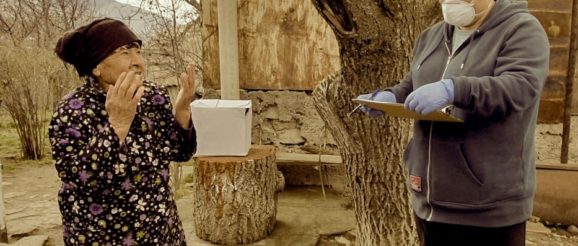Navigating uncertainty in Armenia with innovation | UNDP in Europe and Central Asia

When you launch a crisis management strategy, you hope that systems are already in place, officials are aware of the resources, and citizens trust and obey the rules. But many crises do not come with such a landscape.
COVID-19 arrived in Armenia in a period of complex political and economic developments.
The 2018 revolution generated a wave of political and social renewal. The new government embarked on a path of difficult reforms, including how civil service and courts operate, and how information is shared with citizens. UNDP and other development partners have been supporting this total system restart.,
This major change made the country’s institutions more open but also more fragile. On one hand, the openness creates a unique opportunity for transparent, quick and citizen-focused action. But on the other, its fragility (and often imperfect communication channels between government agencies) makes response to crises, like the COVID pandemic, more difficult. It’s a mix that must be well managed if we want to build a renewed trust and contract between citizen and state and put Armenia on a more resilient path.
Then, the spread
Although it started off as a healthcare issue, COVID-19 soon took over the economic and political space. As with many other countries, Armenia had to quickly mobilise, commit resources and make difficult choices. Many citizens, still remembering deprivations of the early 1990s, saw this period as an overreaction to an invisible enemy. The economy, constrained by Armenia’s isolation even before COVID, risked losing its core – the small businesses, which count for 90 percent of enterprises.
As we looked for solutions to this crisis, we knew innovation could be key.
Innovation units are often called “pins on the government’s suits” – decorative but with little or no functionality. User research and human-centrism are often limited to “boutique” consultancies.
But not for us at UNDP Armenia. We have helped to build a chain of functioning innovation units inside the system. We created a diverse platform that includes the SDG Innovation Lab, a government-based delivery unit; Kolba Lab, a human-centric social innovation space; and Impact Aim, a tech venture accelerator. Innovation is largely mainstreamed into UNDP’s gender and human rights portfolios and serves as a strong enabler for good governance work. Since 2012, this platform has built networks among users and decision-making allies. And the return on our investment is obvious: when the crisis hit, the innovation platform was one of the first to respond to the panic button, offering its networks and ideas.
Where others were reprogramming to adjust to the new context, our innovation portfolio was accelerating its existing activities.
Building capabilities for shock
Three tailored acceleration programs on climate change, gender and agriculture have softly moved online and been tailored to the COVID reality. This maintains that the generation of new skills, jobs and investment – essential in the post-COVID recovery – continue uninterrupted.
Work around gender quality swiftly moved online as well, as we redesigned digital leadership schools for women, youth and school children, and provided trainings on new-reality skills.
The employment innovation program, which brought a foresight of future skills in the pre-COVID reality, is using its new KolbaJobs platform to offer remote and freelance job opportunities to those locked home. And if you are under quarantine, there is Oasis, a closed micro-community developed by the SDG Innovation Lab. It targets Covid-19 patients and those isolated or self-isolated, helping them to overcome the difficulties of quarantine, avoid situations of knowingly/unknowingly breaking the rules, and prevent the virus from spreading.
The employment innovation program, which brought a foresight of future skills in the pre-COVID reality, is using its new KolbaJobs platform to offer remote and freelance job opportunities to those locked home. And if you are under quarantine, there is Oasis, a closed micro-community developed by the SDG Innovation Lab. It targets Covid-19 patients and those isolated or self-isolated, helping them to overcome the difficulties of quarantine, avoid situations of knowingly/unknowingly breaking the rules, and prevent the virus from spreading.
